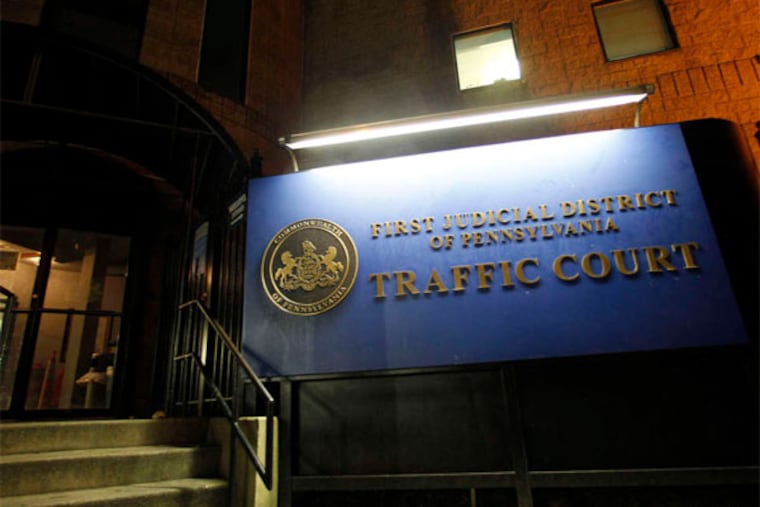Witnesses make case for eliminating Traffic Court
Common Pleas Court Judge Gary S. Glazer, the reformer brought in to drive out corruption at Philadelphia Traffic Court, was joking - sort of.

Common Pleas Court Judge Gary S. Glazer, the reformer brought in to drive out corruption at Philadelphia Traffic Court, was joking - sort of.
Glazer predicted that it would take just an hour for the culture of corruption in the court to come roaring back once he left his post as supervising judge.
An aide said Glazer had it all wrong.
His prediction: 15 minutes.
Glazer told the story Friday as he appeared before a legislative panel considering a plan to abolish Traffic Court and replace its elected judges with hearing examiners who are part of Municipal Court.
Glazer joined a series of witnesses, including a top official of the Philadelphia District Attorney's Office and advocates of court reform, in endorsing the plan.
They said that only such a systemic overhaul of the Traffic Court would root out the culture of compliance with what Glazer termed "a seemingly insatiable demand for fixing tickets."
But critics, including three Democratic members of the state House from Philadelphia, said eliminating the seven elected Traffic Court judgeships would unfairly disenfranchise voters.
"Citizens deserve to elect their judges," Rep. Ronald Waters told the five members of the Judiciary Committee who attended the hearing in Philadelphia. "The court should be fixed, not destroyed."
The proposed legislation to abolish the court appears to have a strong shot of passage in Harrisburg. It unanimously passed the Republican-controlled Senate last month. Republicans also are in the majority in the lower chamber, and the legislation's sponsor, state Sen. Dominic Pileggi of Delaware County, is majority leader there.
Even with the package advancing, no fewer than 41 candidates have filed papers to run in the May primary election, vying for three vacancies on Traffic Court. The judgeships pay $91,000 yearly.
The Supreme Court removed the previous administrative judge and installed Glazer, a former federal corruption prosecutor, after the FBI raided Traffic Court in 2011.
At the urging of Chief Justice Ronald D. Castille, Philadelphia court officials also commissioned an inquiry into Traffic Court. Consultant William G. Chadwick and his team issued a scathing report late last year in which judge after judge admitted that ticket-fixing was rife. In the most-quoted line, the report said the court had "two tracks of justice - one for the connected and another for the unwitting general public."
In January, federal authorities charged nine current and former Traffic Court judges, including Glazer's predecessor, with dismissing or reducing moving violations for family, cronies, and those with political juice. Three former judges have already pleaded guilty.
In his legislative package, Pileggi would first amend the state constitution to disband Traffic Court and fold it into Municipal Court. Such amendments must be passed in two consecutive legislative sessions and then approved by voters statewide. This all means Traffic Court would be abolished in 2015 at the earliest.
Pileggi's package would also remove the three vacancies from the ballot provided the measure becomes law before the general election in November.
In a statement Friday, Kathleen Wilkinson, chancellor of the 13,000-member Philadelphia Bar Association, took no position on whether Traffic Court judges should continue to be elected. "That issue we haven't closely examined," she said later.
Wilkinson did urge that Traffic Court judges be required to be lawyers. She said her association could then subject them to its rigorous vetting, in which it declares whether judges are qualified.
Currently in Pennsylvania, Traffic Court judges as well as magistrates in suburban areas need not be lawyers.
Glazer disagreed, saying that the concept that Traffic Court was a "people's court" was worth keeping provided political influence was kept out.
Ed McCann, the first assistant district attorney, said the federal indictments were "shocking and disheartening."
"The ticket-fixing undermined the credibility of the justice system as a whole and was an embarrassment to the city," McCann testified.
In a statement submitted to the panel, the Committee of Seventy supported abolishing Traffic Court. The statement noted, "Any last-minute attempts to salvage it misunderstand how deeply and irretrievably polluted the court is."
Lynn Marks, executive director of Pennsylvanians for Modern Courts, a nonpartisan statewide group that lobbies on judicial issues, endorsed the use of appointed examiners.
Marks pointed out that many people may never have any contact with the criminal or civil courts, but tickets for errant driving are common.
Last year, Philadelphia police issued about 160,000 tickets to drivers for moving violations.
Appeals were heard at the 115-employee Traffic Court, at Eighth and Spring Garden Streets. The court took in $25 million in fines last year.
In contrast, parking tickets and meters generate about $115 million in revenue yearly. Appeals of parking tickets are heard by appointed examiners at a city office, at Ninth and Filbert Streets.